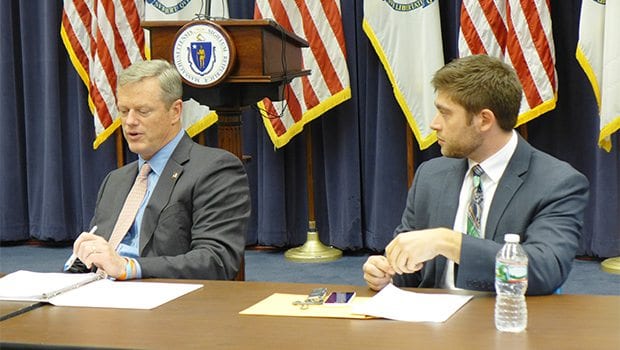Minority-, women-owned businesses to see boost
State to actively recruit diverse contract suppliers, says Baker

The Baker administration will take a more active approach on generating contracting with small businesses and those owned by minorities and women, the governor said Monday, during a roundtable discussion with ethnic media.
The state’s recruitment methods fall behind modern standards, said Gov. Charlie Baker. Currently, the state posts jobs on its website and waits for responses. In today’s environment, he said, an employer must also visit events and join organizations that serve the kind of diverse young professionals they wish to recruit for jobs and bidding, learn best practices from other groups and use social media.
“In this day and age, if you don’t do that sort of thing, the likelihood that you’ll succeed in a lot of your initiatives, especially in workforce, is pretty small,” said Baker.
Efforts will be made to simplify the process for certifying the status of minority-owned and women-owned businesses. That means streamlining the process and simplifying state accreditation for businesses already meeting criteria set forth by nationally-recognized organization such as the Center for Women & Enterprise and Greater New England Minority Supplier Development Council, said Baker and Jabes Rojas, deputy chief of staff for Access and Opportunity.
“The state’s credentialing process is terrific if you’re a big company who’s familiar with it, have done it before, and have resources to deliver on it. That’s not necessarily true for small business,” said Baker.
The governor added that the state plans to write RFPs that are easier for small businesses to address, while educating suppliers new to government contracts about existing opportunities and how best to bid.
Under consideration as well: raising benchmarks for the portion of state discretionary spending that goes to procuring goods and services from businesses that are small, minority- and women-owned.
Transport privatization
In order to provide greater and more cost-effective transport, the administration also is soliciting proposals from private carriers to provide smaller vehicles for late-night services, express bus transit and lightly-traveled routes. Baker says this would free up the drivers and large buses serving those circuits for deployment on more heavily-trafficked routes and more high-demand times.
“We’d redeploy buses that currently run on those routes to routes that are oversubscribed, where people can’t get on the bus, especially in the morning, because there’s no room on the bus or people are packed in and it’s simply a bad customer experience,” said Baker.
“No one’s going to get laid off,” he emphasized.
Drivers on the late-night shift are paid time-and-a-half, yet serve so few passengers that in effect, the state spends an additional $20 per rider at these times, said Mark Steffen, the governor’s deputy press secretary.
The governor is not set on privatization: “If we don’t get good proposals, we’re not going to do anything,” Baker said.
Rail against winter
An $83 million initiative aims to prevent last winter’s crises. The third rail lines that crashed after becoming exposed to the elements last winter are being refurbished. Other improvements include snowplows affixed to the front of trains, snow fence installation, independent snowplows and upgrades to switches and traction motors.
Baker said they will conduct a series of drills and simulations from October through November to ensure personnel know how to deal with potential winter challenges.
“We are far better prepared for this winter than we were last winter,” he said.
Fate of the Green Line
“I support the project, and I believe in the project, but I don’t support and believe in it for $3 billion. My expectation is we will be able to find a way to reduce that price tag and continue to do the work,” said Baker.
The governor said that December 2014 estimate put the Green Line extension cost $4 billion, with $2 billion to be provided by the state and $2 billion from the federal government. This past June, these estimates increased, pegging the state’s payment at $3 billion. The administration will look for ways to reduce costs and expects to complete its assessment by late November, said Baker.
“We have a real cost-estimation issue with respect to way we’re doing business as a city,” he added.
Early education
Baker said $45 million will be dedicated over three years to add “significant early childhood education capacity” in 25 schools in Boston, Lawrence, Springfield, Lowell and Holyoke. Childcare providers would hold their programs in public school buildings. By enrolling children in the buildings where they may later attend elementary school, the program has potential to create stability and a sense of progress for the kids, said Baker.
Further initiatives
Baker said his housing policy will focus on creating more working-affordable dwellings instead of focusing on rent-control or subsidizing and that recent projects had included rehabilitation and renovation awards to improve existing housing stock. He said he also aims for a bill on hydro and solar power this fall.






